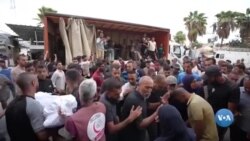ນຶ່ງປີຜ່ານມາ, ການປະທະກັນທີ່ລຸກໄໝ້ຂຶ້ນຈາກການໂຈມຕີກໍ່ການຮ້າຍຂອງ ກຸ່ມຮາມາສ ຕໍ່ ອິສຣາແອລ ທີ່ເຮັດໃຫ້ມີຜູ້ເສຍຊີວິດຮອດ 1,200 ຄົນ ສົ່ງຜົນໃຫ້ມີການປະທະກັນຮຸນແຮງເພີ້ມຂຶ້ນ ເຊິ່ງມີຜູ້ເສຍຊີວິດຫຼາຍກວ່າ 40,000 ຄົນແລ້ວ, ແລະກາຍມາເປັນໄພຂົ່ມຂູ່ທີ່ຈະລາມອອກໄປເຂດຕາເວັນອອກກາງ. ບັນດາຝ່າຍທີ່ປະທະກັນ ໄດ້ອອກມາປະຕິເສດຕໍ່ຂໍ້ຕົກລົງສັນຕິພາບ, ພ້ອມທັງບໍ່ສົນໃຈນຳການໂຈະ ແລະການຢຸດຍິງເລີຍ, ປະທານາທິບໍດີສະຫະລັດ ຄົນຕໍ່ໄປ ກໍຈະຕ້ອງໄດ້ສືບທອດຄວາມທ້າທາຍດັ່ງກ່າວນີ້.
ບໍ່ມີຫຍັງທີ່ຈະສະເຫຼີມສະຫຼອງ ໃນຂະນະທີ່ຄວາມຂັດແຍ້ງດັ່ງກ່າວນີ້ ກໍຄົບຮອບນຶ່ງປີ.
ຄວາມຮຸນແຮງໃນພາກຕາເວັນອອກກາງເພີ້ມຂຶ້ນຢ່າງຫຼວງຫຼາຍ ໃນຊ່ວງເວລານັ້ນ. ຢູ່ເໜືອດິນແດນ ອິສຣາແອລ ທີ່ເລີ້ມຂຶ້ນໃນວັນທີ 7 ຕຸລາ ເມື່ອກອງກໍາລັງຂອງພວກຫົວຮຸນແຮງຮາມາສ ໄດ້ເປີດການໂຈມຕີແບບປະຫຼາດໃຈໃຫ້ແກ່ພວກເຂົາເຈົ້າ ແລະໄດ້ຈັບໂຕປະກັນຫຼາຍກວ່າ 250 ຄົນ ເຂົ້າໄປໃນຂົງເຂດກາຊາ, ເຊິ່ງຕ້ອງອົດທົນກັບການໂຈມຕີຖິ້ມລະເບີດ ແລະການປະຕິບັດການທາງພາກພື້ນດິນຂອງ ອິສຣາແອລ ມາເປັນເວລາຫຼາຍເດືອນ, ແລະຈາກນັ້ນ ກໍເຂົ້າໄປໃນ ເລບານອນ, ບ່ອນທີ່ເມື່ອບໍ່ດົນມານີ້ ອິສຣາແອລ ໄດ້ທໍາການບຸກໂຈມຕີທາງອາກາດຕໍ່ກຸ່ມຫົວຮຸນແຮງເຮັສໂບລລາ ອັນໄດ້ສັງຫານຜູ້ນຳຂອງກຸ່ມດັ່ງກ່າວ, ຈຶ່ງກະຕຸ້ນໃຫ້ເກີດການຕອບໂຕ້ທີ່ຮ້າຍແຮງຈາກກຸ່ມຫົວຮຸນແຮງທີ່ໄດ້ຮັບການສະໜັບສະໜູນຫຼັກຈາກ ອີຣ່ານ.
ທີ່ປຶກສາດ້ານຄວາມໝັ້ນຄົງແຫ່ງຊາດສະຫະລັດ ທ່ານ ເຈັກ ຊູລລິວານ ກໍາລັງຫາທາງຜ່ອນຄາຍຄວາມເຄັ່ງຕຶງ ໃນອາທິດນີ້ ລຸນຫຼັງການໂຈມຕີຄັ້ງຫຼ້າສຸດຂອງ ອີຣ່ານ.
ທ່ານ ເຈັກ ຊູລລິວານ, ທີ່ປຶກສາດ້ານຄວາມໝັ້ນຄົງແຫ່ງຊາດ ກ່າວວ່າ:
“ແນ່ນອນ, ນີ້ແມ່ນເຫດການອັນສໍາຄັນ, ມັນແມ່ນເຫດການສໍາຄັນທີ່ເພີ້ມທະວີຂຶ້ນໂດຍ ອີຣ່ານ. ແລະມັນກໍມີຄວາມໝາຍເທົ່າທຽມກັນທີ່ພວກເຮົາສາມາດ ກັບ ອິສຣາແອລ ເອົາມາດຕະການ ແລະສ້າງສະຖານະການທີ່ບໍ່ມີໃຜເສຍຊີວິດ ໃນການໂຈມຕີຢູ່ ອິສຣາແອລ ເທົ່າທີ່ພວກເຮົາຮູ້ໃນເວລານີ້.”
ບັນດານັກວິເຄາະກ່າວວ່າ ຍັງບໍ່ຈະແຈ້ງວ່າ ມັນຈະສິ້ນສຸດລົງແນວໃດ.
ເຈຣອລ ຟາຍເອີສຕາຍນ໌ (Gerald Feierstein), ຜູ້ອຳນວຍການໂຄງການແຫຼມຂອງອາຣາເບບ ແລະທັງເປັນຜູ້ອາວຸໂສທີ່ຊົງກຽດເພື່ອການທູດ ຈາກສະຖາບັນຕາເວັນອອກກາງ ກ່າວຜ່ານຊູມວ່າ:
“ບໍ່ມີຂໍ້ຊີ້ແຈງຢ່າງຈະແຈ້ງວ່າ ທັງຊາວອິສຣາແອລ ຫຼື ກຸ່ມຮາມາສ ກຳລັງພະຍາຍາມຫາຈຸດຈົບ. ເບິ່ງຄືວ່າ ພວກເຂົາທັງສອງມີຄວາມອາດສາມາດ ແລະເຕັມໃຈທີ່ຈະປະຕິບັດການຕໍ່ໄປອີກໄລຍະນຶ່ງ ໃນຕໍ່ໜ້າ.”
ຄວາມກົດດັນທາງການທູດກໍາລັງນັບມື້ເພີ້ມຂຶ້ນ, ເປັນຈໍານວນຫຼາຍກວ່າ 140 ປະເທດທີ່ຮັບຮູ້ ປາແລັສໄຕນ໌ ເປັນປະເທດ, ລວມທັງ ໄອແລນ, ນໍເວ ແລະສະເປນ, ທີ່ໄດ້ສະແດງຄວາມເຫັນໃນປີນີ້.
ໃນຂະນະທີ່ບັນຫາຂັດແຍ້ງດັ່ງກ່າວຍັງຄົງຮັດແໜ້ນ ແລະເຄັ່ງຕຶງ, ບັນດານັກວິເຄາະ ໄດ້ຊີ້ໃຫ້ເຫັນເຫດຜົນຕ່າງໆຂອງການປະທະກັນຢ່າງຕໍ່ເນື່ອງ. ປັດໄຈອັນທີນຶ່ງຄື ຄວາມພະຍາຍາມຂອງ ອິສຣາແອລ ທີ່ຈະກໍາຈັດ ກຸ່ມຮາມາສ ແລະ ກຸ່ມເຮັສໂບລລາ, ເຊິ່ງເປັນສິ່ງທີ່ບໍ່ຍິນດີ ໃນບັນດາຜູ້ນໍາອາຣັບຈໍານວນນຶ່ງ.
ທ່ານ ສຕີເວັນ ຄຸກ (Steven Cook), ຈາກສະພາການພົວພັນຕ່າງປະເທດກ່າວວ່າ:
“ມັນເປັນການຍາກສໍາລັບຂ້າພະເຈົ້າທີ່ຈະເຊື່ອວ່າ ຊາວຊາອູດີ, ຊາວອາຣັບເອັມມີເຣດ, ຊາວບາເຣນ, ແລະຄົນອື່ນໆບໍ່ເຊື່ອວ່າ ພາກພື້ນດັ່ງກ່າວນີ້ ຈະບໍ່ມີ ກຸ່ມເຮັສໂບລລາ, ບໍ່ມີກຸ່ມຮາມາສ ຫຼື, ກຸ່ມຮາມາສ ແລະ ກຸ່ມເຮັສໂບລລາ ຫຼຸດລົງຫຼາຍແລ້ວ, ມັນຈະເປັນພາກພື້ນທີ່ດີກວ່າເກົ່າ.”
ໃນຂະນະດຽວກັນ, ບັນດານັກວິເຄາະກ່າວວ່າ ການໂຈມຕີຂອງກຸ່ມຮາມາສ ໄດ້ເສີມຂະຫຍາຍກຸ່ມລັດອິສລາມອື່ນໆເຊັ່ນ ອາລ-ຊາບາບ (al-Shabab) ຂອງໂຊມາເລຍ ຫລື ກຸ່ມລັດອິສລາມ ທີ່ມາຈາກເຄືອຂ່າຍອື່ນ ແລະ ອາລ-ກາອີດາ.
ທ່ານ ຟາຣະ ປານດິດ (Farah Pandith), ຈາກສະພາການພົວພັນຕ່າງປະເທດ:
“ສິ່ງທີ່ເກີດຂຶ້ນ, ໃນຂະນະທີ່ພວກເຮົາພິຈາລະນາເບິ່ງເສັ້ນທາງຂອງເຫດການທີ່ເກີດຂື້ນ ນັບຕັ້ງແຕ່ການໂຈມຕີທີ່ໂຫດຮ້າຍ ແລະເປັນຕາຢ້ານ ໃນວັນທີ 7 ຕຸລາ ປີກາຍນີ້, ຄືວ່າ ແຕ່ລະກຸ່ມເຫຼົ່ານີ້ ໄດ້ນໍາໃຊ້ລະບົບນິເວດ ເພື່ອຈຸດປະສົງຕ່າງໆຂອງພວກເຂົາເອງ.”
ສິ່ງທີ່ເບິ່ງຄືວ່າ ບໍ່ມີການປ່ຽນແປງແມ່ນ ຈຸດຢືນຕໍ່ ອິສຣາແອລ ຂອງປະທານາທິບໍດີ ໂຈ ໄບເດັນ. ສະຫະລັດ ແມ່ນຜູ້ສະໜັບສະໜູນໃຫຍ່ທີ່ສຸດຂອງ ອິສຣາແອລ, ທັງທາງດ້ານການທະຫານ ແລະດ້ານການທູດ.
ພາຍໃຕ້ການບັນຊາຂອງ ທ່ານ ໄບເດັນ, ກອງກໍາລັງສະຫະລັດ ມີບົດບາດສຳຄັນໃນການຊ່ວຍເຫຼືອ ອິສຣາແອລ ຕ້ານການໂຈມຕີດ້ວຍລູກສອນໄຟຂີປະນາວຸດສອງຄັ້ງຈາກ ອີຣ່ານ.
ທ່ານ ໄບເດັນ ຢູ່ນະທີ່ນີ້ ກັບພວກເຂົາເຈົ້າ ຕັ້ງແຕ່ມື້ຫຼັງຈາກ ວັນທີ 7 ຕຸລາ.
ທ່ານ ໂຈ ໄບເດັນ, ປະທານາທິບໍດີສະຫະລັດ ກ່າວວ່າ:
“ພວກເຮົາຕ້ອງເປັນຄົນທີ່ມີຄວາມແຈ່ມແຈ້ງ. ພວກເຮົາຢືນຢູ່ກັບ ອິສຣາແອລ.”
ແລະໃນອາທິດນີ້:
“ຢ່າຄິດຜິດພາດໄປ, ສະຫະລັດ ແມ່ນຜູ້ສະໜັບສະໜູນຢ່າງເຕັມສ່ວນ, ແລະເຕັມອັດຕາ ຂອງ ອິສຣາແອລ."
ໃນຂະນະທີ່ວັນຄົບຮອບອັນໜ້າເສົ້າໃຈນີ້ມາຮອດ, ສອງສິ່ງທີ່ສະແດງໃຫ້ເຫັນຢ່າງຈະແຈ້ງກໍຄື ຄວາມຂັດແຍ້ງດັ່ງກ່າວ ຈະບໍ່ສິ້ນສຸດໃນໄວໆນີ້, ແລະໄລຍະເວລາໃນການດໍາລົງຕໍາແໜ່ງຂອງ ທ່ານ ໄບເດັນ ກໍາລັງຈະສິ້ນສຸດລົງ.
ອ່ານບົດລາຍງານດ້ານລຸ່ມນີ້ເປັນພາສາອັງກິດ
One year on, a conflict sparked by Hamas' terror attack on Israel that killed 1,200 people has grown into a raging conflict that has killed more than 40,000 and threatens to engulf the Middle East. The warring parties have rebuffed peace deals and blown through pauses and cease-fires – and the next U.S. president will likely inherit the challenge. VOA’s Anita Powell reports from Washington.
There is nothing to celebrate as this conflict nears its one-year anniversary.
Violence in the Mideast has grown considerably in that time; beyond Israel, where it started October 7......when Hamas militants launched their surprise attack and snatched over 250 hostages...into Gaza, which for months has endured Israeli bombardments and ground operations; ... and then into Lebanon, where Israel recently struck at the Hezbollah militant group with airstrikes that killed its leader ….... provoking this fiery response from the militant group’s main backer, Iran.
U.S. national security adviser Jake Sullivan sought to soothe nerves this week after the latest Iranian attack.
Jake Sullivan, National Security Adviser.
"Obviously, this is a significant escalation by Iran, a significant event. And it is equally significant that we were able to step up with Israel and create a situation in which no one was killed in this attack in Israel so far as we know at this time."
Analysts say it’s not clear how this ends.
Gerald Feierstein, Middle East Institute.
“There’s no clear indication that either the Israelis or Hamas is looking for an end. They both seem to be able and willing to carry this on for quite some time to come.”
Diplomatic pressure is intensifying, as more than 140 countries recognize Palestine as a state, including Ireland, Norway and Spain, which did so this year.
As this conflict twists and turns, analysts point to reasons the clashes continue. One factor: Israel’s effort to wipe out Hamas and Hezbollah is not unwelcome among some Arab leaders.
Steven Cook, Council on Foreign Relations.
"It’s hard for me to believe that the Saudis, the Emiratis, the Bahrainis, and others don’t believe that a region without Hezbollah, without Hamas — or, a much-diminished Hamas, a much-diminished Hezbollah — is a better region.”
At the same time, analysts say the Hamas attack emboldened other Islamist groups like Somalia’s al-Shabab or offshoots of Islamic State group and al-Qaida.
Farah Pandith, Council on Foreign Relations.
“What has happened, as we look at the trajectory of events that have happened since the brutal and horrific attacks of October 7, is that each one of these groups have utilized the ecosystem for their purposes.”
What doesn’t appear to have changed is President Joe Biden's stance on Israel. The U.S. is Israel’s largest backer, both militarily and diplomatically.
Under Biden’s command, U.S. forces played key roles in helping Israel repel two Iranian ballistic missile strikes.
Here he is days after October 7.
U.S. President Joe Biden.
"We must be crystal clear. We stand with Israel."
And this week:
"Make no mistake, the United States is fully, fully, fully supportive of Israel.”
As this grim anniversary looms, two things are crystal clear: this conflict won’t end soon. Biden’s term will.






ຟໍຣັມສະແດງຄວາມຄິດເຫັນ